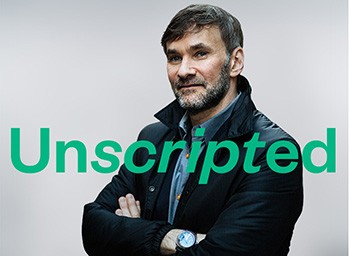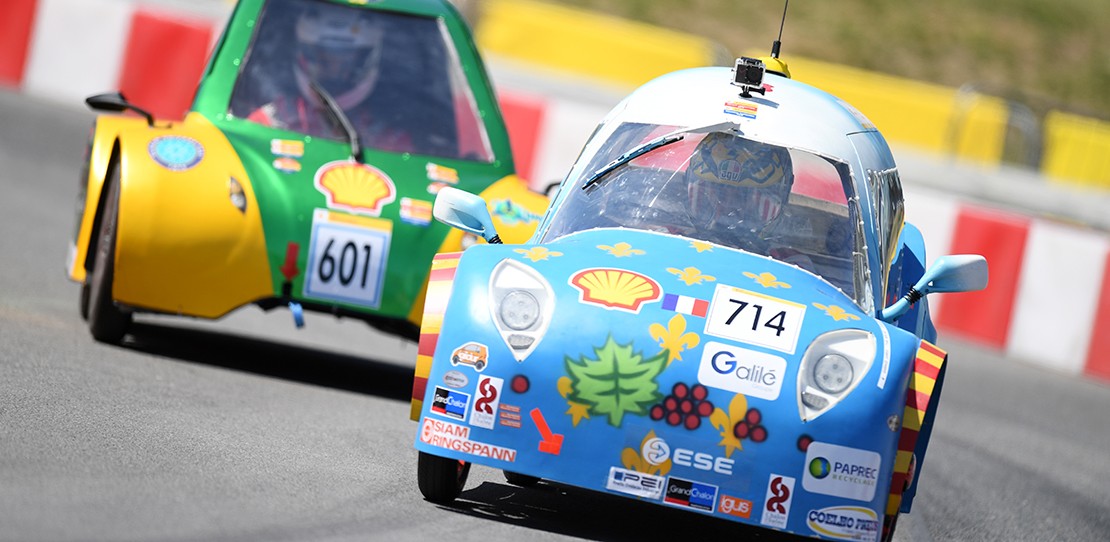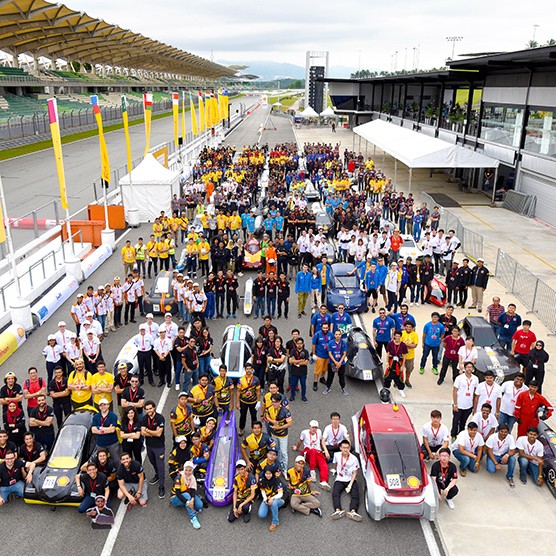
Keith Ferrazzi, Bestselling Author and Coach, Talks Co-Elevation
A global thought-leader in behavioral and collaborative sciences explains how to create teams that won’t let each other fail.

Photo Credit: Photographic Services, Shell International Limited
Can you envision a car built from broken hockey sticks or one made of bamboo and a biodegradable resin? The world’s leading engineering and technology students can, and they bring such concepts to life at Shell Eco-marathon—where brilliant minds come together to create a lower-carbon future.
Shell believes that young people play a leading role in our transition to new—and cleaner—forms of energy. Indeed, they will rise to become tomorrow’s disruptors and industry pioneers. They will make important decisions that influence the world around them.
Photo Credit: Photographic Services, Shell International Limited
This guiding principle is one reason the global energy producer hosts the Shell Eco-marathon programme. For this annual competition, thousands of top engineering and technology students imagine, design, build, and race energy-efficient vehicles.
But the Shell Eco-marathon of today, one of the largest events of its kind, started out from humble beginnings.
A Friendly Wager
It was a friendly wager between a group of Shell scientists in 1939 that started it all: Who could drive the farthest on the least amount of fuel?
At the company’s first Mileage Marathon event in the United States, it was Bob Greenshields who proved that he could. Bob drove a remarkable 49.7 miles per gallon in a 1933 Plymouth Coupe. Even by today’s standards, it was quite an achievement, almost doubling the current US average of 25 mpg.
The Mileage Marathon continued off and on as a staff competition until 1985, when organizers decided to open the event up to young people—those who would one day enter the industry as professionals. With that decision the event became officially known as Shell Eco-marathon.
Entering the World Stage
Norman Koch began his career at Shell 25 years ago as a testbed engineer in the automotive research lab. After three years on the job, Norman was asked to volunteer as a “scrutineer” at a Shell Eco-marathon event.
Scrutineering refers to the technical inspection that occurs before the race, which teams must pass before they can set their vehicles on the track. Norman described this phase as one of the more anxiety-inducing points in the competition. “It’s the blood, sweat, and tears they invested throughout the year coming to fruition,” he said.
After his first event, Norman was hooked. Years later, he saw an opportunity to take “one of Shell’s best kept secrets” to the world stage. What started out in Europe expanded to Fontana, California, in 2007. In 2010, it extended to Malaysia, and since then, it’s occurred every year across Asia, the Americas, and Europe.
In 2015, Norman left the world of R&D to make his side hustle a full-time job, becoming general manager of the Global Shell Eco-marathon Programme. His passion and Shell’s unwavering commitment helped create what is now one of the world’s leading student design competitions, with a community of 10,000 contenders and over 500 institutions in more than 50 countries.

Photo Credit: Photographic Services, Shell International Limited
After more than 20 years with the programme, Norman is still driven by two passions: engineering and opportunity.
“First, I’m an engineer at heart. It’s so encouraging to hear such fantastic ideas, whether they’re from a team from Saudi Arabia, the United States, or South Africa,” he said. “To see what they come up with and how they retool when they get something wrong is exhilarating and a sight to behold.”
“I was moved to meet an all-female team from Alfaisal University in Saudi Arabia,” Norman said. He then recalled his interaction with Shams Alshuwaier, a 22-year-old mechanical engineering student and the team’s leader, who said: “Girls and women should be included in everything. We want to show the world how the women of Saudi Arabia are actively supporting the automotive industry. Hopefully, this will change people’s perceptions.”
In Norman’s view, technical learning isn’t the only thing the competition offers to academia. It provides students with an opportunity to step away from the classroom to deal with real-world challenges, like making tough decisions, working on a team, and managing time and money.
It’s heartening to see that ideas can trump money.
Global General Manager, Shell Eco-marathon
Photo Credit: Photographic Services, Shell International Limited
Ideas Trump Money
The teams love having the freedom to innovate and design, and that freedom ends up playing a key role in helping them achieve the goal of maximizing every drop of fuel or every kilowatt of electricity. This spirit of innovation, more than anything else, can lead to victory.
Of the 450 teams in the competition, some are well-funded; they come from engineering schools that are conducting world-leading research and have industry sponsors. Often, a few of these teams end up on top. But other teams with limited backing excel, too. They’re able to build a car for $500 and still make it to the leaderboard.
“It’s heartening to see that ideas can trump money,” Norman said.
Photo Credit: Photographic Services, Shell International Limited
One team couldn’t afford to freight their car, so they brought it over in approximately eight different pieces in their suitcases. “From an engineering point of view, that’s brilliant,” Norman said. “Yes, you can spend a lot of money on building and shipping a car, but you can also use your brain to find economical solutions.”
In fact, a lack of financial resources has produced some innovative concepts during past competitions, in electric vehicle battery management and biodegradable composite materials. And the ideas keep on coming, in electric/hydrogen mobility, autonomous vehicles, and different types of fuel.
Photo Credit: Photographic Services, Shell International Limited
An NI Partner Gets in the Driver’s Seat
Shell Eco-marathon relies on a network of partners that donate their time, technology, expertise, and funds in support of the programme.
At the end of 2015, NI Partner Schmid-Elektronik answered a challenge from NI to participate in building an entire telemetry system prototype in just eight weeks. An international team across companies, countries, and continents was formed consisting of hardware and software developers and systems engineers that later became the event’s official Data and Technology Team.
In just one week, Schmid created a minimum viable product with a software API on a CompactRIO system, put the system online in Switzerland, and soon, all were developing software code in parallel at lightning speed based on a microservice architecture. They rolled out a prototype that went online in February 2016 in Malaysia.
Today, the telemetry system is in every race using an ARM/Linux platform. In agile processes, its embedded software is regularly extended and validated with hardware in the loop (HIL) on a PXI platform with NI TestStand software. The massive data from every race day is processed with LabVIEW as part of the “race-operating system.” The high abstraction that the software provides helps Schmid adapt code rapidly under high-pressure conditions.
The system connects the vehicles to the IoT environment, measuring and comparing the consumption of three energy types: internal combustion, battery electric, and hydrogen. Plus, during the best-in-class race, the system captures and streams whatever’s happening in the cockpits and engines to the race organizers, teams, spectators, and social media, creating a fever-pitch of excitement in its final moments.
NI caught up with Marco Schmid, entrepreneur and CEO of Schmid Elektronik, to ask him what motivated his company to donate their time to this competition. “Shell Eco-marathon provides a way to give back and be a part of a talented and inspired community,” Marco said. “It’s an honor to support this competition with cutting-edge technology and engagement, creating a new customer experience through digitalization and making energy efficiency really cool.”
In addition to deploying, running, maintaining, and collecting data for the telemetry system, Schmid leaders travel to competitions to be a part of the inspection team. Their goal is to pass on knowledge and inspire the next generation of engineers, and they’re committed to creating a future of sustainable, clean energy. “The competition allows me to step away from my desk and get my hands dirty under the hoods of the race vehicles,” Marco said. “What started as a project has become a business model and transformed our mindset to be bold and take on new challenges.”
A Record Stands
The competition organizers pivoted quickly in 2020 to a virtual model because of the pandemic. For now, the Shell Eco-marathon record for distance per liter of fuel stands at 3,771 km, the equivalent of traveling from London to Rome and back.
For Shell, this programme is more important than ever. It underscores their commitment to be carbon neutral by 2050 and is a tangible expression that it’s helping to educate the next generation who will shape our future.
For Norman, this programme is deeply personal and meaningful. “It’s about the love of science, the love of engineering, and the personal stories of the students,” Norman said.
Photo Credit: Photographic Services, Shell International Limited
ARM, Keil, and μVision are trademarks or registered trademarks of ARM Ltd or its subsidiaries.
The registered trademark Linux® is used pursuant to a sublicense from LMI, the exclusive licensee of Linus Torvalds, owner of the mark on a worldwide basis.
An NI Partner is a business entity independent from NI and has no agency, partnership, or joint-venture relationship with NI.